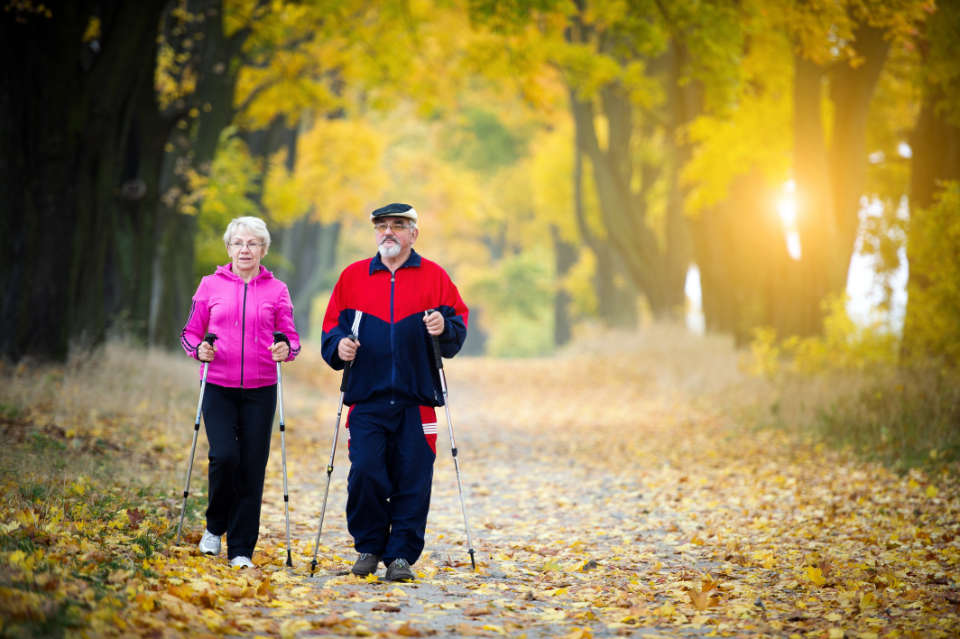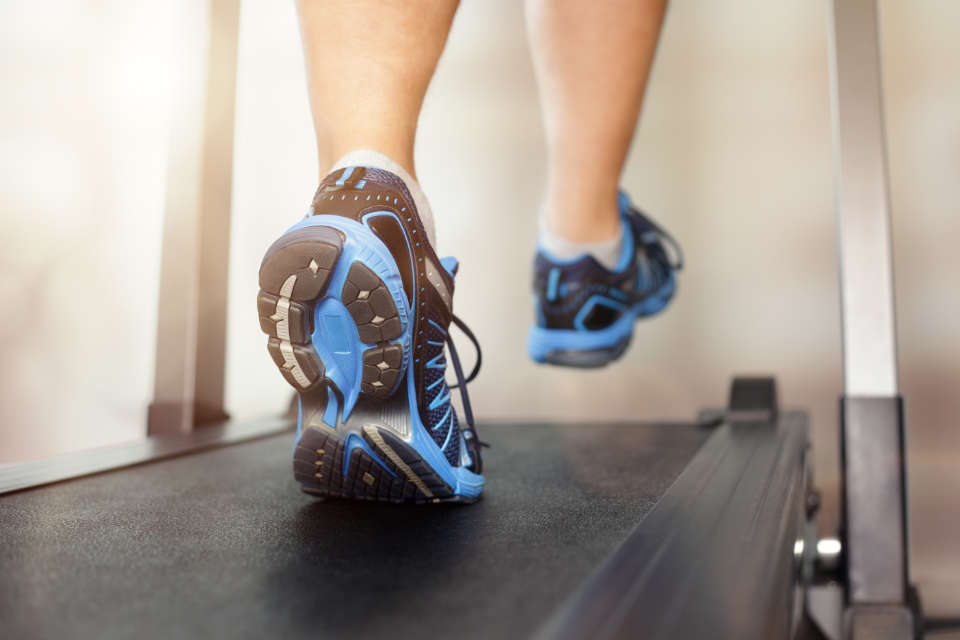For most of us our fitness plans begin and end on a gym membership. We think it’s obvious – a gym has all the machines and free weights required to lose weight, build muscles, and simply amp up overall health.
What many don’t know is that we can attain the same benefits from running and walking as well. Both activities provide an abundance of physical and mental health benefits.
We’re not suggesting that you quit your gym altogether. No, but incorporating a walk or run in your daily workout regime is highly recommended and will do you a lot of good in the long run.
In fact, experts suggest that brisk walking for 30 minutes at a moderate speed every day can burn 150 – 200 calories. Additionally, long walks can help clear your thoughts and calm you down.
Here are the health benefits of walking and running you didn’t know!
1. Running helps you live longer
A study published in Archives of Internal Medicine concluded that runners tend to live longer than those who don’t perform this form of exercise regularly. The study followed 1,000 adults (aged above 50) for 21 years. At the end of the study, 85% of runners were still alive while only 65% of non-runners were active.
Another study by the Journal of the American College of Cardiology showed that running or walking for even 5 – 10 minutes a day reduces the risk of death from all causes, including cardiovascular disease.

2. Running boosts your Vitamin D naturally
The human body gets most of its vitamin D from sun exposure. Regrettably, most of us spend so much time indoors that around 41.6 per cent of Americans are deficient in the vitamin, according to a research published in the Nutrition Research. Those who are running low on vitamin D can suffer from:
- Bone pain
- Muscle weakness
- Risk of cardiovascular disease
- Cancer
- Severe asthma [in children]
Vitamin D deficiency has also been shown to increase an individual’s risk of developing dementia and Alzheimer’s. In fact, a study involving 382 participants showed that those with low levels of vitamin D had an increased risk of decline in cognitive ability. Researchers came to this conclusion after taking blood tests of the participants every year for five years along with brain tests and scans.
3. Running improves mood
A 2012 study found that running or walking for just 30 minutes a day can improve a person’s mood, help improve sleep, and increase concentration levels throughout the day.
The University of Michigan also conducted a study which stated that individuals who went through a stressful period in their life can benefit greatly and experience better moods and lowered depression levels after a long, peaceful walk.
4. Running builds self-confidence
Walking and running is an individual sport — and all you need is a pair of good shoes to get going. When you start off on a race, no matter if it’s a mile or a marathon, you set a goal. Run farther or better than before will give you a sense of accomplishment and achievement. Bring the sprint to the great outdoors for an even bigger boost in self-esteem. Research have shown that running outdoors and soaking up the sun can boost a person’s self-esteem.
5. Running helps you cope with stress
Stress relief is one of the most common psychological benefits of running. Stress may come from a variety of causes, such as work, family, or life-changing events. Running do increase the amount of norepinephrine, a chemical that can moderate the brain’s stress response. In fact, running gives you time to think about your issues, or to avoid them for a while.
6. Running burns calories
All forms of exercise help burn calories, right? But, did you know that an hour-long training workout at the gym can burn approximately 300 calories while an hour-long run can burn double the amount?
Health experts further claim that even walking on the treadmill helps and can increase calorie burnout more than the stationary bike, stair-climber, and rower.

Running can help you to shed a few pounds, if you are looking to lose weight. But, remember to incorporate a healthy, balanced diet to get in shape, so that your body is replenished with nutrients.
7. Running is good for old age
We all have to age but most of us are afraid of losing our independence and suffering from immobility in the later years. Well, guess what? Walking also helps here!
According to a study published in the Journal of the American Medical Association, those who had a habit of walking in their youth were more mobile and independent during their old age. The participants aged between 70 and 89 were divided into two groups of walkers and non-walkers.
At the end of the 2.5 year study, the group which exercised regularly was 28% less likely to become disabled and 18% less likely to suffer from physical disability.
8. Running keeps your eyes healthy
Surprisingly, apart from overall health and mental benefits – walking and running are good for our vision as well. A research conducted in 2013 showed that those who walked or ran an average of 5 miles per day had 41% lower risk of developing cataract and age-related vision loss or blindness.
Although the exact reason for the benefit is still unknown, most health experts suggest that running decreases the probability of developing Type 2 diabetes, heart disease, and high blood pressure which can contribute to the development of cataracts.

9. Physical exercise is beneficial for your eyes
Cardiovascular exercises such as aerobics will lower intraocular pressure, which is the pressure in your eyes, it can helps to keep the retinal ganglion cells protected. Cardio exercise also help to increase the flow of blood to the optic nerve and the retina. Therefore, overall eye health and vision can be improved, especially people with glaucoma.
Sometimes, vision problems and eye disease also stem from high blood pressure and high cholesterol. So, include a healthy diet and regular exercise are two of the most important steps you can take to lower both.
10. Go outdoors and get active
During your run, your vision an eyes doesn’t require large amounts of time to exercise. Something as simple as a brisk for 20 minute walk in the park, about four times a week will increase your pulse by as much as 25 percent.
If walking isn’t your forte, you can consider other sports, such as bike riding, swimming, running, dancing, jogging up and down a flight of stairs, to increase your blood flow.
No matter what is the activity that you choose, it will not only be benefiting your eyes and vision, but you’ll be strengthening your overall health as well.
11. Running fights common cold
The British Journal of Sports Medicine claims that those who feel they are about to catch cold can go for a quick 30-minute workout to stimulate their immune system and fight off cold.
The study showed 43% of individuals who were suffering from respiratory tract infection had less severity of their symptoms when compared to those who were non-runners.
The Appalachian State University in North Carolina also suggests that running or walking every day for 30 – 45 minutes can improve a person’s immunity over time and enables them to fight off most diseases and illnesses.
Also, if you have URTI (Upper Respiratory Tract Infection), make sure you monitor closely and avoid overtraining and chronic fatigue. Don’t overdo high intensity training. A runner, who train and race at a faster pace have a higher incidence of URTI.
Don’t overdo long-term workouts, runners who train at 97 kilometers or more per week, experience twice the URTIs compared to those training at 32 kilometers per week.
Drink carbohydrate drinks before, during and after running events or during very heavy exercise sessions. The recommended dose is 30 to 60 grams of carbohydrate during exercise. This will reduce the impact of the stress hormones on your immune system.
12. Running improves sleep in post-menopausal women
Post-menopausal women often experience hot flushes and sweats at night. However, women who walk daily report that they fall asleep much more easily – according to the Fred Hutchinson Cancer Research Center.

Running also do help to reduce hot flash, sleep more and elevates a better mood. Women who exercise did show some improvements in hot flashes. It also helps women to improve their overall health.
13. Numerous other health benefits
It’s also important to mention here that running and walking also help lower blood pressure, decrease the risk of cancer and diabetes, improve memory, and even curb stress eating, otherwise known as binge eating disorder.
In short, running and walking are two of the best ways to make the most of your health and well-being. Above all, you can run anywhere, anytime, and that too without investing in any equipment.
Why Should You Run or Walk Regularly
Going for a run or a walk are activities that are easy to implement in an exercise regime. Whether you are 18 or 80, anyone can benefit from this simple and convenient form of exercise.
So, go out there and enjoy a walk – fast or slow paced. And when you come back, you will definitely thank yourself for reading this article.
Benefits of Running vs Benefits of Walking
When it comes to running or walking, both have benefits that can enhance your mental and physical well-being.
Running’s higher intensity leads to increased cardiovascular fitness, greater calorie burn and more powerful performance responses than walking at a moderate pace. It also helps to improve joint strength, provide stress relief and promote mental clarity.
Walking, on the other hand, carries a lower risk of injury than running due to the reduced strain on the leg muscles it produces.
Additionally, walks are an ideal way for those who are beginning exercise programs to ease into activity levels gradually since it is low impact and easier on the joints compared to more strenuous activities.
Finally, regular walks provide plenty of opportunity for self-reflection while increasing the chance for social engagements which make them an enjoyable experience throughout all seasons.
Top Tips for Running and Walking
Running is a great way to stay healthy, but there are a few tips to keep in mind for safety and effectiveness.
- First and foremost, good nutrition is key; eating a balanced diet and avoiding running right after eating will help make sure you get the most out of your runs.
- Additionally, it’s important to stay hydrated by drinking plenty of water before, during, and after exercise.
- Wear reflective and moisture-wicking clothing if running early in the morning or late in the evening, and try to stick to areas that are safe and secure – avoid isolated pathways.
- It’s essential to take breaks when needed so your body can rest, as well as letting someone know where you plan to run and when you should be back.
- Finally, if you have an injury – rest up first before trying again!
More Benefits of Running and Walking
Is it OK to walk run everyday?
Yes, there are tons of benefits if you walk run everyday, such as lower blood pressure, decrease the risk of cancer and diabetes, improve memory, and even curb stress eating.
Is it sufficient to walk 30 minutes a day?
Yes, study by the Journal of the American College of Cardiology showed that running or walking for even 5 – 10 minutes a day reduces the risk of death from all causes, including cardiovascular disease.
Does walking and running burn calories?
Yes, running and walking can burn calories to help you lose a few pounds of weight.
What will happen to my body if I start to walk everyday?
It will help you to maintain overall health and tone up your muscles. It also improves your mood and help to builds self-confidence.
Is it better to run in the morning or evening?
Should you run in the morning or evening? According to science, the best time for long-distance running is late afternoon or early evening. On the other hand, if your goal is to tackle depression or achieve faster weight loss, then an early morning run would be more effective.
How long does it take to see results from running?
If you are new to running, you can anticipate seeing an increase in your aerobic fitness within four to six weeks of committing to a weekly routine. On the other hand, more experienced runners may not experience as much of a noticeable difference since their respiratory system has already evolved due to consistent exercise.
Should I run on an empty stomach?
When it comes to running, it is best practice to fuel your body with a snack before you exercise. Eating too much can leave you feeling uncomfortable while running, but if you prefer running on an empty stomach, be sure to stick to light or moderate running. This will help ensure that your body has enough energy to sustain itself through the workout.
Should I drink water before running?
It is important to remember to stay hydrated before, during, and after a run. Make sure you drink at least 2 cups (16oz) of water two hours prior to running for maximum hydration. This will give your body enough time to absorb the water, so that it can be used during your workout for optimal performance.





